MercoPress. South Atlantic News Agency
Tag: Nicolas Maduro
-
Thursday, January 17th 2019 - 07:42 UTC
Bolsonaro and Macri agree to “review and perfect” Mercosur, and advance trade talks with EU
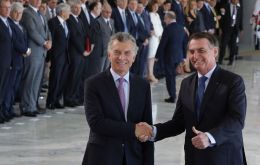
Brazil’s president Jair Bolsonaro and Argentina’s president Mauricio Macri said they agreed to continue integrating their economies (number one and two in South America), as strategic partners, by “perfecting” the Mercosur trade block and pressing ahead with negotiations that are already underway, such as the ongoing free trade and cooperation agreement with the European Union.
-
Wednesday, January 16th 2019 - 08:35 UTC
Maduro declared an “usurper” by Venezuela's freely elected National Assembly

Venezuela's opposition-run congress on Tuesday formally declared President Nicolas Maduro a “usurper” whose actions would be considered null and void, after he was sworn in last week for a disputed second term. Maduro was inaugurated on Jan. 10 under an avalanche of criticism that his leadership was illegitimate following a 2018 election widely viewed as fraudulent.
-
Tuesday, January 15th 2019 - 09:20 UTC
The salary is tripled in Venezuela: Increases to 6 dollars

Nicolás Maduro ordered an increase of 300% of the minimum wage on Monday, the 26th time he makes an announcement of this kind during his term. Also, an increase in the petro cryptocurrency was decreed and the president highlighted the economic management of his government, which he said in his annual report helped to turn Venezuela into the country with “greater socioeconomic equality”.
-
Tuesday, January 15th 2019 - 09:19 UTC
Ireland's Sinn Féin attends Maduro's inauguration and praises Venezuelan election

A Sinn Féin MLA has defended his attendance at the inauguration of the Venezuelan president and denied that the election was fraudulent. Nicolas Maduro was sworn in for a second term as Venezuela's president last Thursday.
-
Monday, January 14th 2019 - 18:06 UTC
Uruguay: “Deep concern” about detention of the Venezuelan Parliament president
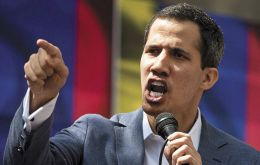
The Ministry of Foreign Affairs expressed on Monday, through a statement, its “deep concern” regarding the “serious institutional crisis” and the “acts of intimidation” that led to the arrest and subsequent release of the president of the National Assembly of Venezuela, Juan Guaidó , by officials of the Bolivarian National Intelligence Service (Sebin).
-
Monday, January 14th 2019 - 00:50 UTC
Detention of the Venezuelan Parliament President shows the “rupture” in the Maduro regime

Officials of the Bolivarian Service of National Intelligence (Sebin) retained the deputy Juan Guaidó, President of the National Assembly (AN) and Venezuela’s President-in-charge, when he was going to an open Parliament hall in the north of the country. Minutes later, the parliamentarian was released and attended to the event with a wounded hand and ensuring that the Armed Forces do not want Nicolás Maduro, president considered “de facto” by the Parliament and part of the international community.
-
Saturday, January 12th 2019 - 11:12 UTC
Venezuela in conflict of powers: Maduro took office, but Guaidó shows as president while Venezuelans protest
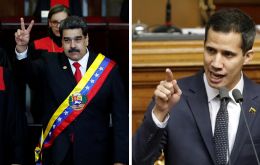
It seemed sure that, starting January 10, Venezuela would experience high uncertainty. Nicolás Maduro swore in the presidency for the 2019-2015 government period in front of the Supreme Court of Justice (TSJ), when the constitution of that country dictates that it is before Parliament that the president must present the inauguration. Both the international community and the National Assembly (AN), declared in contempt by the Supreme Court, mark Maduro as an usurper. The illegitimacy of the president is discussed globally and Juan Guaidó is recognized as interim president of the Republic.
-
Friday, January 11th 2019 - 12:29 UTC
Argentina only recognizes Venezuela's National Assembly; bans entry to Maduro regime top officials
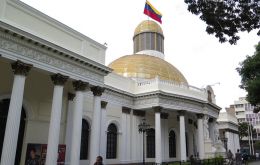
Argentina announced it does not recognize the legitimacy of the mandate initiated on 10 January by Nicolas Maduro, condemns the breakdown of constitutional order and rule of the law, and ratifies full recognition of the National Assembly as the only democratically elected branch of government in Venezuela.
-
Friday, January 11th 2019 - 08:54 UTC
Maduro sworn as president but most of the Americas reject his legitimacy
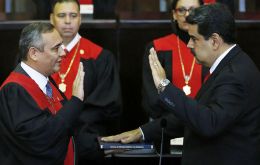
Venezuelan President Nicolas Maduro was sworn into a second term on Thursday amid international calls for him to step down, a devastating economic crisis and growing diplomatic isolation.
-
Thursday, January 10th 2019 - 18:12 UTC
Paraguay breaks relations with Venezuela on the day of the Maduro’s takeover
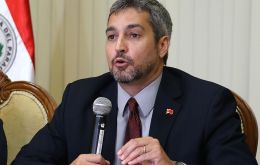
Mario Abdo Benítez, president of Paraguay, announced on Thursday the rupture of diplomatic relations with Venezuela after threats from the Venezuelan president in response to the repudiation of his new mandate by the Lima Group, of which Paraguay is a member.
